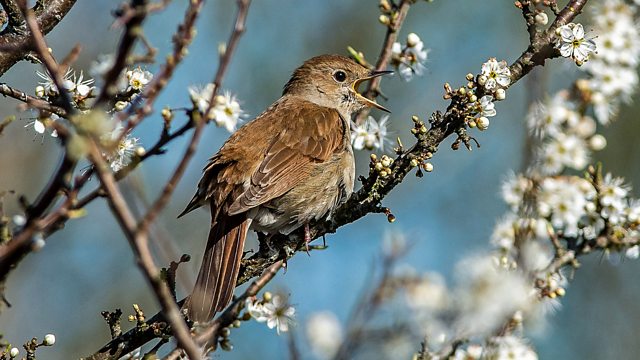
Episode 8
The team looks back at another hectic week on the Sherborne Park Estate. Plus, Gillian Burke investigates the arms race that happens between plants and their pollinators.
It is the end of the second week of Springwatch and the team looks back at another hectic week on the Sherborne Park Estate, full of fledging, predation and non-stop action.
Chris and Michaela are joined at Sherborne by guests Iolo Williams and Lucy Cooke and investigate the latest news from the bird nests, see how the local amphibians are doing after the tough winter and delve into the macro world of solitary bees, with an exclusive new camera.
There is an update on the long-eared owls and goshawk nests from Wales and the latest data on the plight of the UK's cuckoos, where the English population is faring badly, but the Scottish birds seem to be doing better.
Gillian Burke joins an expert from the National Botanic Garden of Wales to look into the arms race that happens between plants and their pollinators, and Michaela visits a famous Avon gorge in the final installment of her trip through Bristol's rivers, looking into the plastic problem.
Richard Taylor-Jones films an astonishing piece of behaviour in Kent, where grass snakes hunt Britain's rarest amphibian - the great crested newt. And Iolo Williams visits Lamlash Bay, the site of a remarkable community-based marine conservation campaign to see what a difference their efforts have made on the sea floor.
Last on
Music Played
Timings (where shown) are from the start of the programme in hours and minutes
-
![]() 00:32
00:32Leftfield
Melt
Credits
| Role | Contributor |
|---|---|
| Presenter | Chris Packham |
| Presenter | Michaela Strachan |
| Presenter | Gillian Burke |
| Presenter | Iolo Williams |
| Presenter | Lucy Cooke |
| Director | Tony Grech-Smith |
| Producer | Laura Whitley |
| Executive Producer | Rosemary Edwards |
Broadcasts
- Thu 7 Jun 2018 20:00�鶹������ҳ��� Two except Wales
- Sat 9 Jun 2018 18:00�鶹������ҳ��� Two Wales
Download your FREE ‘Wildlife Watch’ poster and find out about the OU’s citizen science mission ‘Springtime Renewal’
‘Springtime Renewal’ with the OU
Explore some simple but powerful ways to make a positive impact on nature and the environment with The Open University
What can you do to help nature and the environment?

